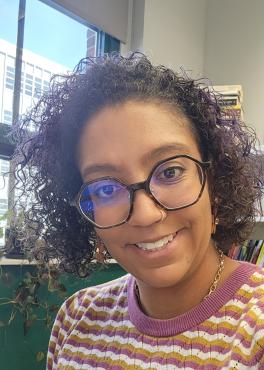Theresa Hice-Fromille is an Assistant Professor in the Department of Geography and an Ohio Prison Educational Exchange Program faculty member. Her research interests consider Black geographies of the past, present, and future in speculative fiction and lived experience to consider how it might inform practices in education, travel, and community building in the virtual and real worlds.

How and when did you become involved with OPEEP?
I first heard about OPEEP when I was interviewing at OSU and I was able to complete instructor training at the end of my first year as a faculty member.
What course will you be teaching in Spring 2026, and what topics are you excited about covering with your students?
I will be teaching “Economies, Space, and Society,” which is a seminar open to graduate students and advanced undergrads. Since I come to the discipline of Geography through Black geographies specifically, I have shaped this class to focus on the interrelationship of these three broad themes within the conceptualization, lived experiences, and perpetuation of the plantation. The course starts on the Caribbean plantation, moves to the U.S. South, U.S. North, and Southeast Asia, and then goes into digital structures.
Students always express surprise reading Stephanie Jones-Rogers’ They Were Her Property (2019), which demonstrates how white women in the U.S. South were socialized to be slave mistresses and used slave ownership to build wealth independent from their husbands. I think it is such a wonderful text to dive into and hits on topics of childhood and youth which I always try to work into my courses. I also really enjoy discussing data infrastructure and digital mapping architecture with students. Luis Alvarez Leon has a wonderful book (The Map in the Machine (2024) that thoroughly explains the capitalist logics of geospatial data collection and use by companies such as Google. In 5401, we push a bit further to understand how capitalist logics of pervasive digital technologies are inherently racial and rooted in the plantation.
What goals/takeaways would you like students to leave your class with?
I love to wrap up the class with Afrofuturist imagination exercises. It’s important to me that we end on a hopeful note. These exercises help drive home the fact that all the difficult things we learned about throughout the semester can be changed. We all have the capacity to build just economies, societies, and spaces and we can do that better when we know the ins and outs of the plantation logics that we refuse.
What is the one thing you wish more people knew about prison abolition and transformative justice?
I really wish more people understood that we are all less safe and less free because of the prison system. I want us all to think more about how we enact carceral logics in so many mundane ways. Especially in schools and universities! Abolition starts with questioning all practices that uphold punishment and exclusion overgrowth and dialogue.
What do you like to do in your free time?
I enjoy baking – even though I only have about a 50% success rate with my bakes. I also love movie nights with my family, whether it’s at the theater or at home (I make really yummy caramel popcorn!).
